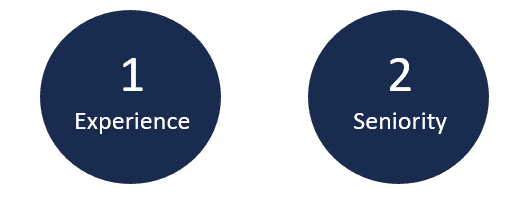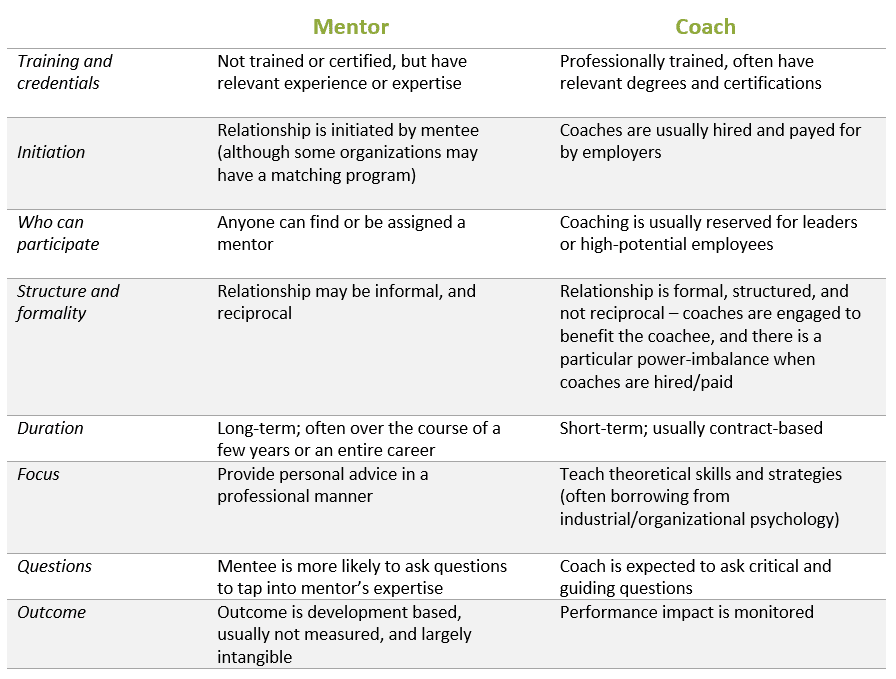Coaching vs. Mentoring
A good coach can change a game. A great coach can change a life.
John Wooden
One of the most frequently asked questions about coaching is, ‘”What is the difference between a coach and a mentor?” Coaching and mentoring are in fact very similar, but there are a few key differences to keep in mind. In this article we’ll take a look at the role of a coach versus a mentor and discuss when each option might be the best fit for your organization.
Coaching
The Role of a Coach
Studies are showing that the role of coaches has changed over the years. At the turn of the century, coaches were primarily hired to address toxic behavior among business leaders. Today, most coaching focuses on developing high-potential employees.[i] Overall, coaches guide reflection, offer expert advice, set measurable performance goals, and track progress towards completion of these goals. If you’re looking for short-term, goal-oriented, personalized consulting, coaching might be the right option for you.
What it Takes to be a Coach

Today there are approximately 53,000 professional coach practitioners around the world.2 It is becoming increasingly common for coaches to have earned some form of degree or certificate, largely due to the fact that nearly 1 in 3 clients look for credentials when hiring a coach.2 Beyond credentials, clients also look for coaches who have experience expertisecoaching professionals in similar industries and roles.[ii] Finally, coaches also require a core set of skills to be effective. These soft skills are what set great coaches apart.
Coaching Skills
- Active listening
- Communicating
- Responding nonjudgmentally to clients
- Facilitating discussion
- Fostering learning through increased reflection and self-awareness
- Helping clients to set personally-meaningful goals
- Monitoring and encouraging progress
- Genuinely caring for the growth and well-being of clients
Mentoring
The Role of a Mentor
Mentors differ from coaches primarily because the relationship is more informal. Mentoring involves listening, reflecting, and giving advice, but the process is usually less structured and more informal than a coaching engagement.
The goal in a mentorship relationship is to help professionals navigate their career and achieve personal development goals. One of the most common roles of a mentor is to help new employees navigate the onboarding processes. This would involve a more experienced employee taking a new hire under their wing for the first few weeks of employment. Individuals may also volunteer to mentor or be assigned a mentor through professional associations. For example, if you are a human resources (HR) professional, you will most likely be a member of the Society for Human Resource Management (SHRM), which provides ongoing training and development, as well as a one-on-one mentoring program.[iii]
What it Takes to be a Mentor

Mentors are usually experienced professionals in the same field or organization as the mentee. Unlike coaches, mentors generally don’t have any form of ‘mentorship’ credential, but they are often older and more senior members of the same profession. Mentors may be internal to an organization, or external, but they should always have a degree of connection to the mentee’s role, organization, and/or industry.
In a Nutshell
Finally, for a quick summary of how mentors and coaches compare, take a look at the chart below:

Looking for More?
Are you interested in learning more about coaching? SIGMA is here to help! Over the last 50 years we’ve worked with more than 8,500 private and public organizations to develop people potential and increase organizational effectiveness. We provide custom coaching, consulting and succession planning services, as well as a host of assessments to guide your development efforts. To learn more about our solutions, contact us directly for more information.
[1] Coutu, D., Kauffman, C. (2009). What Can Coaches do for You. Harvard Business Review. https://hbr.org/2009/01/what-can-coaches-do-for-you.
[2] ICF., PWC. (2016). ICF Global Coaching Study. https://coachfederation.org/app/uploads/2017/12/2016ICFGlobalCoachingStudy_ExecutiveSummary-2.pdf.
[3] SHRM. (2020). Our Mentoring Program. SHRM. Retrieved from https://www.shrm.org/resourcesandtools/tools-and-samples/presentations/pages/thementoringprogram.aspx.